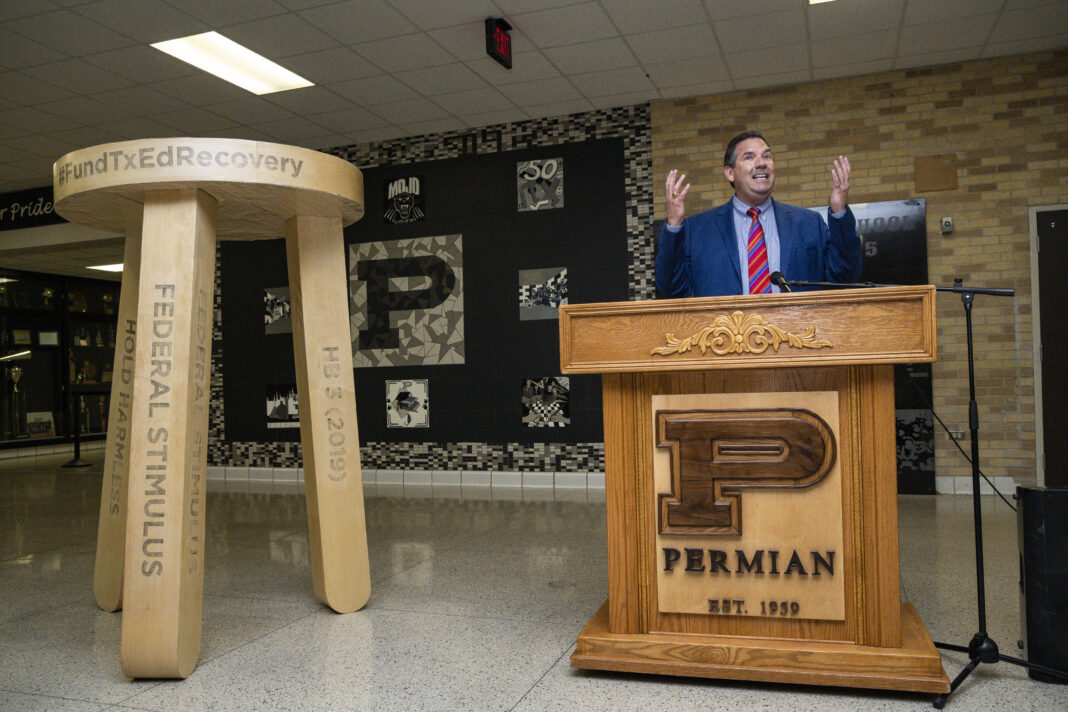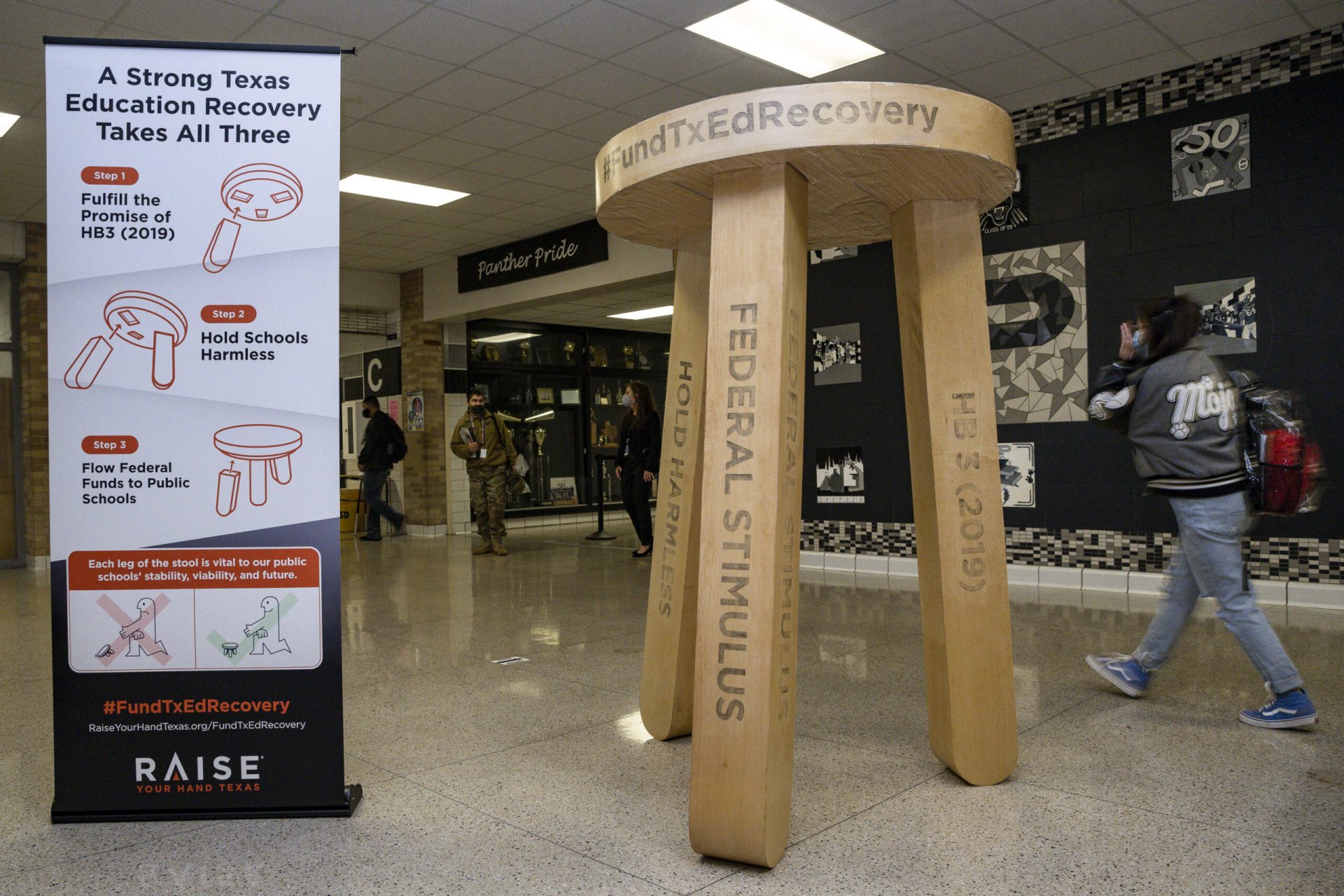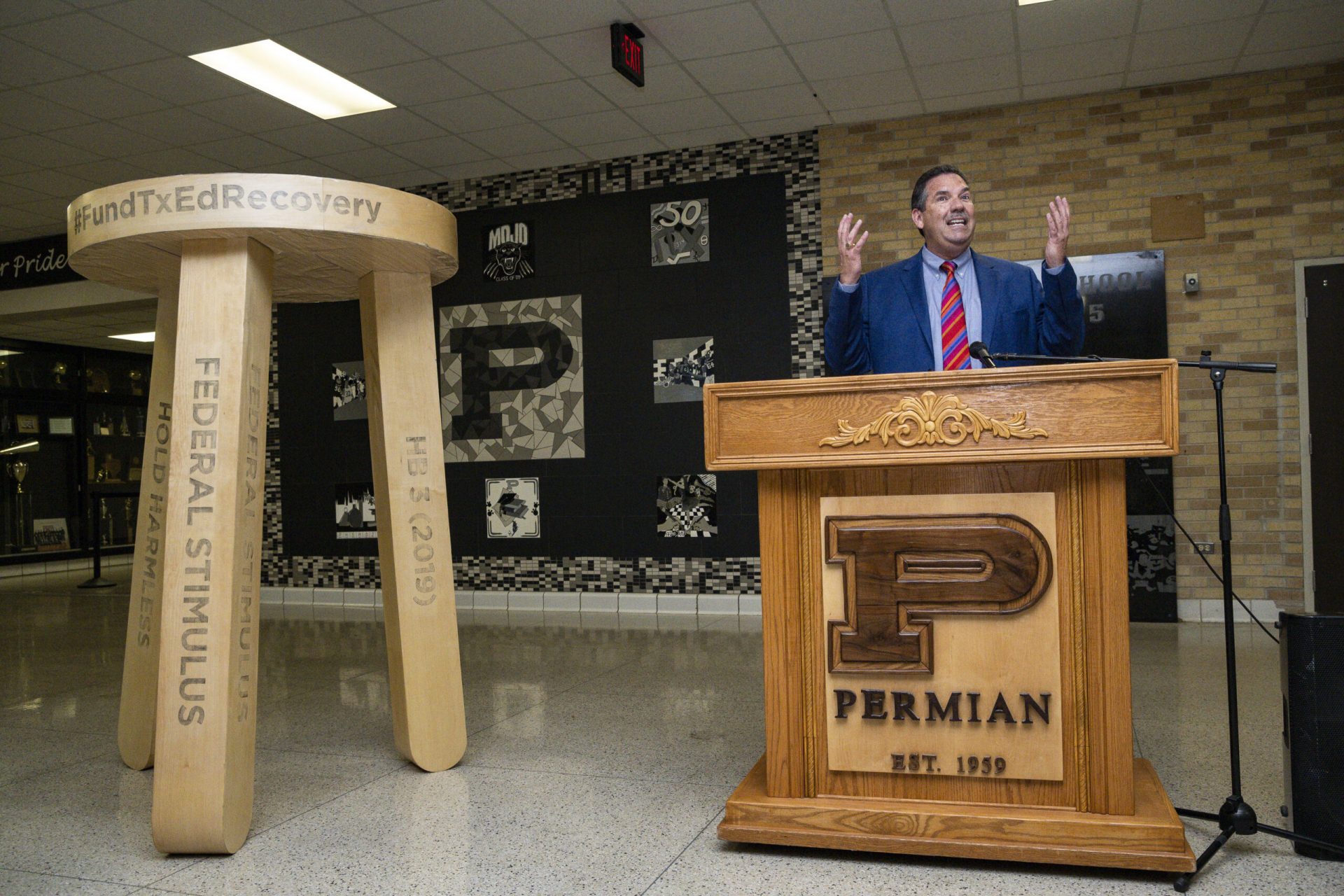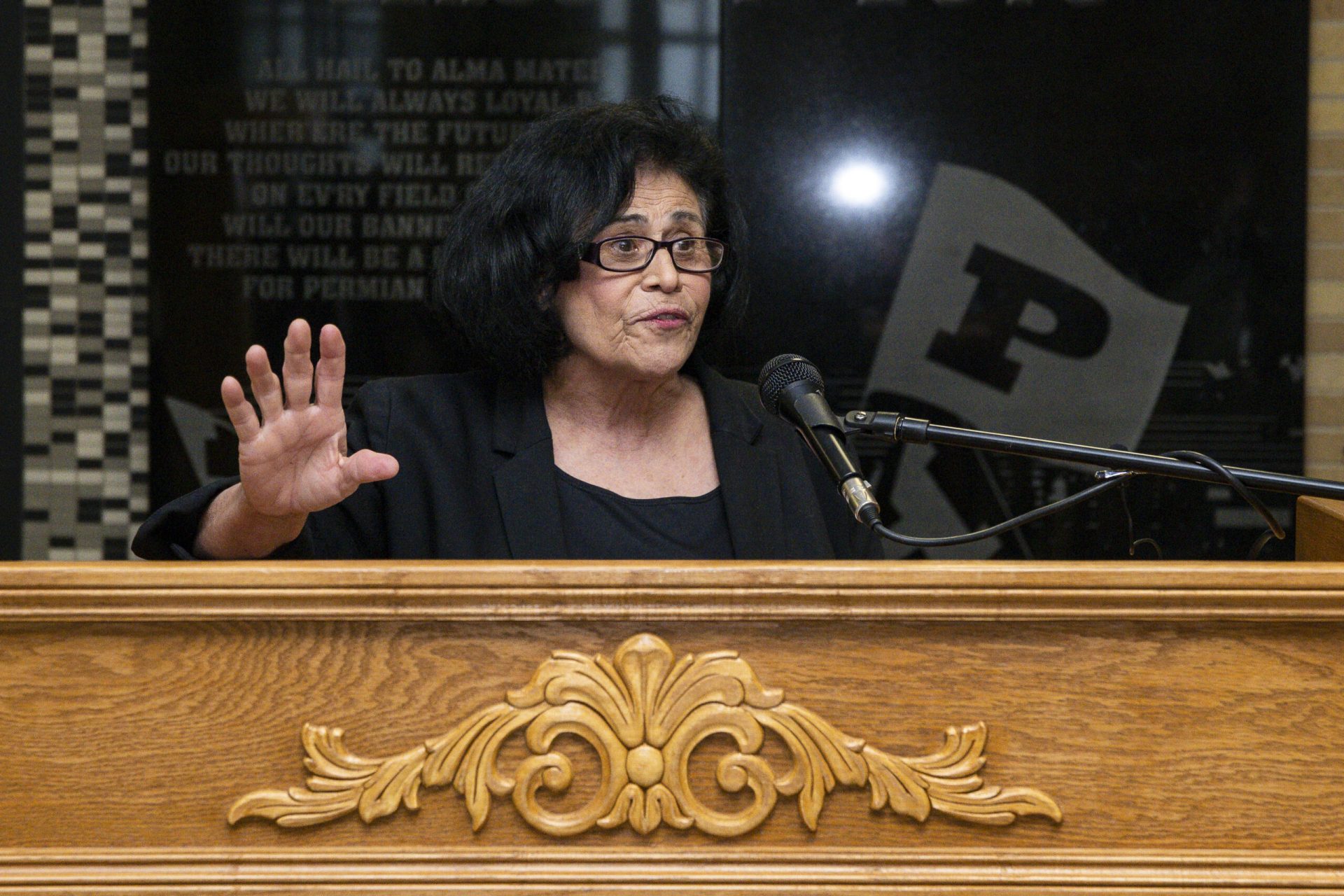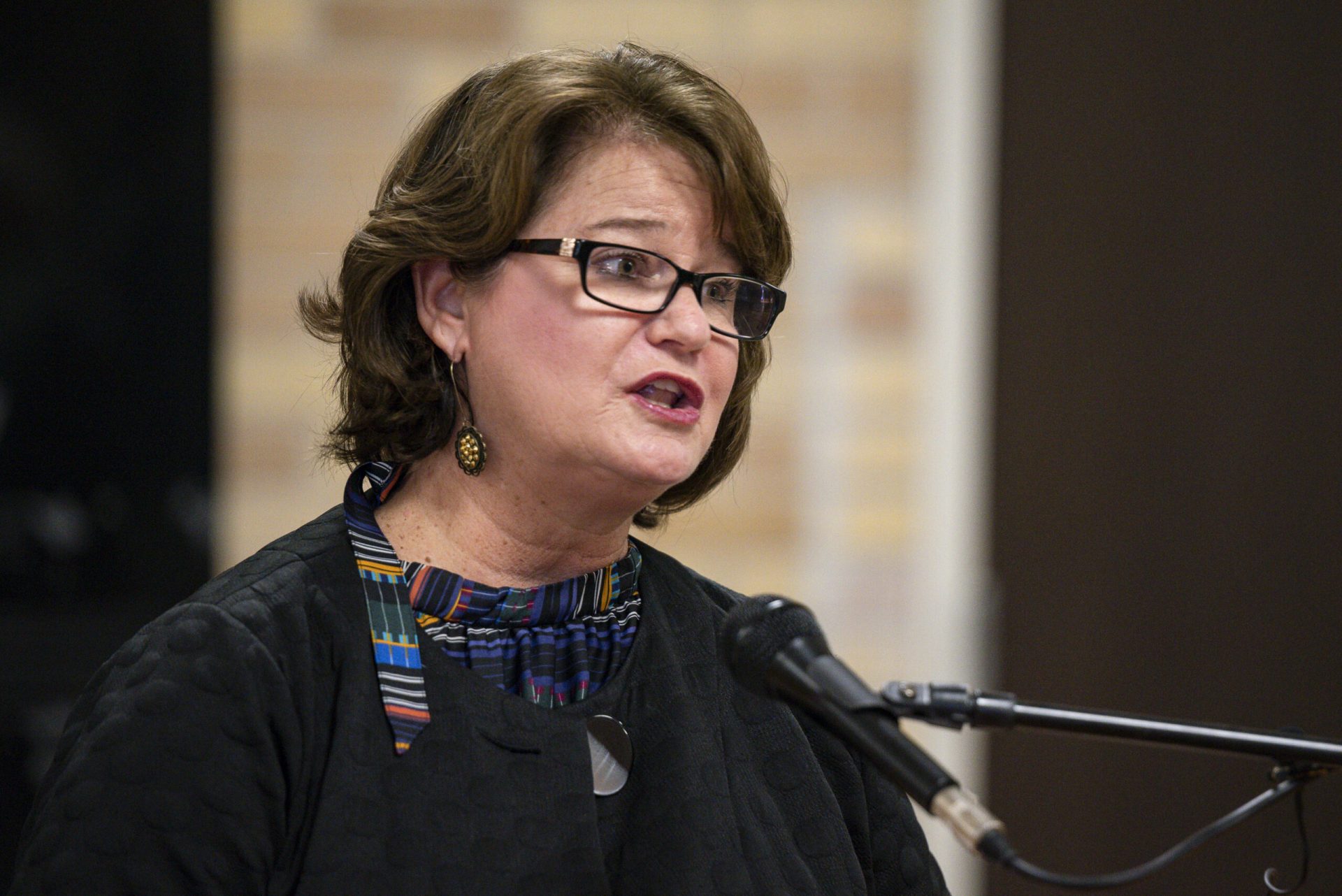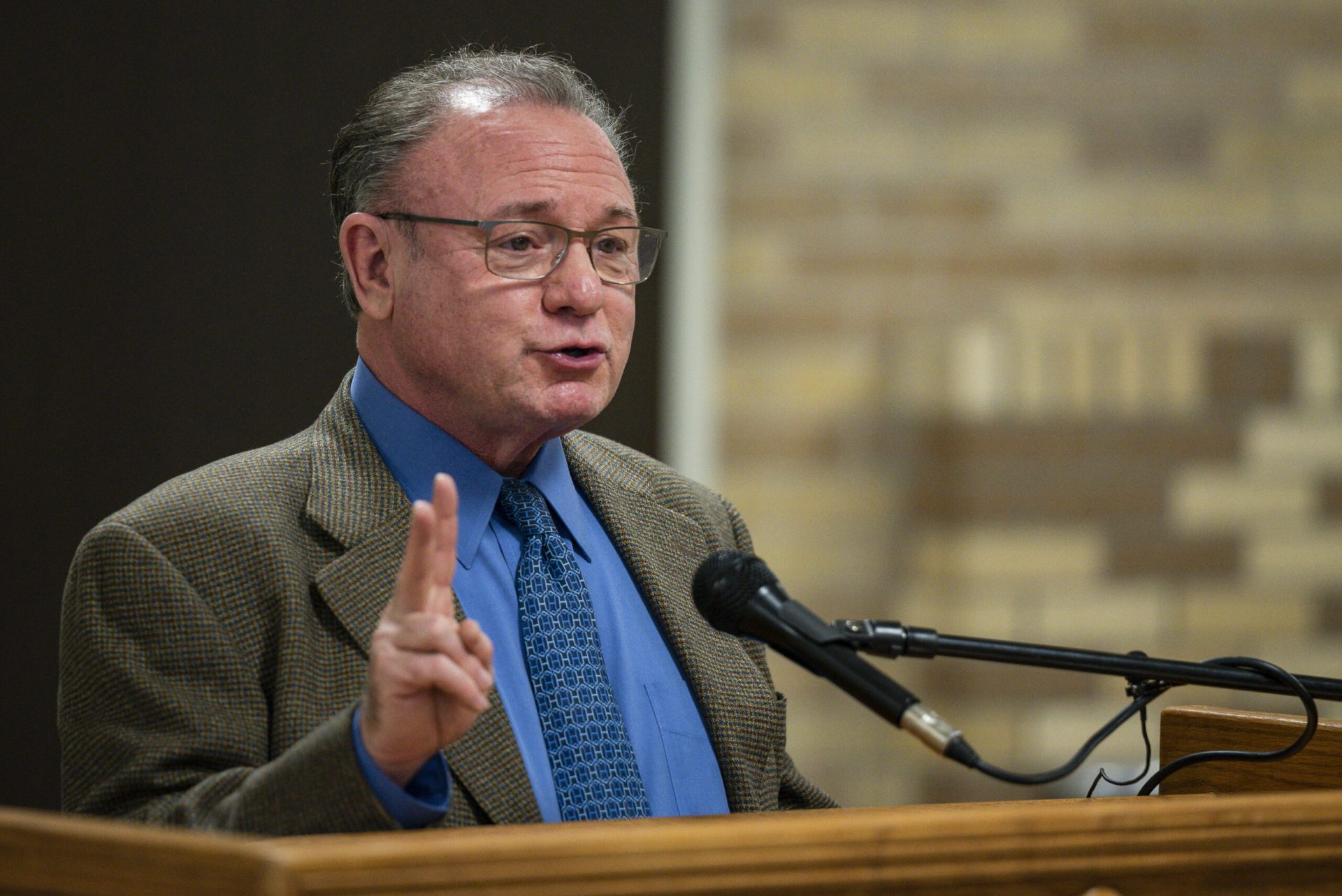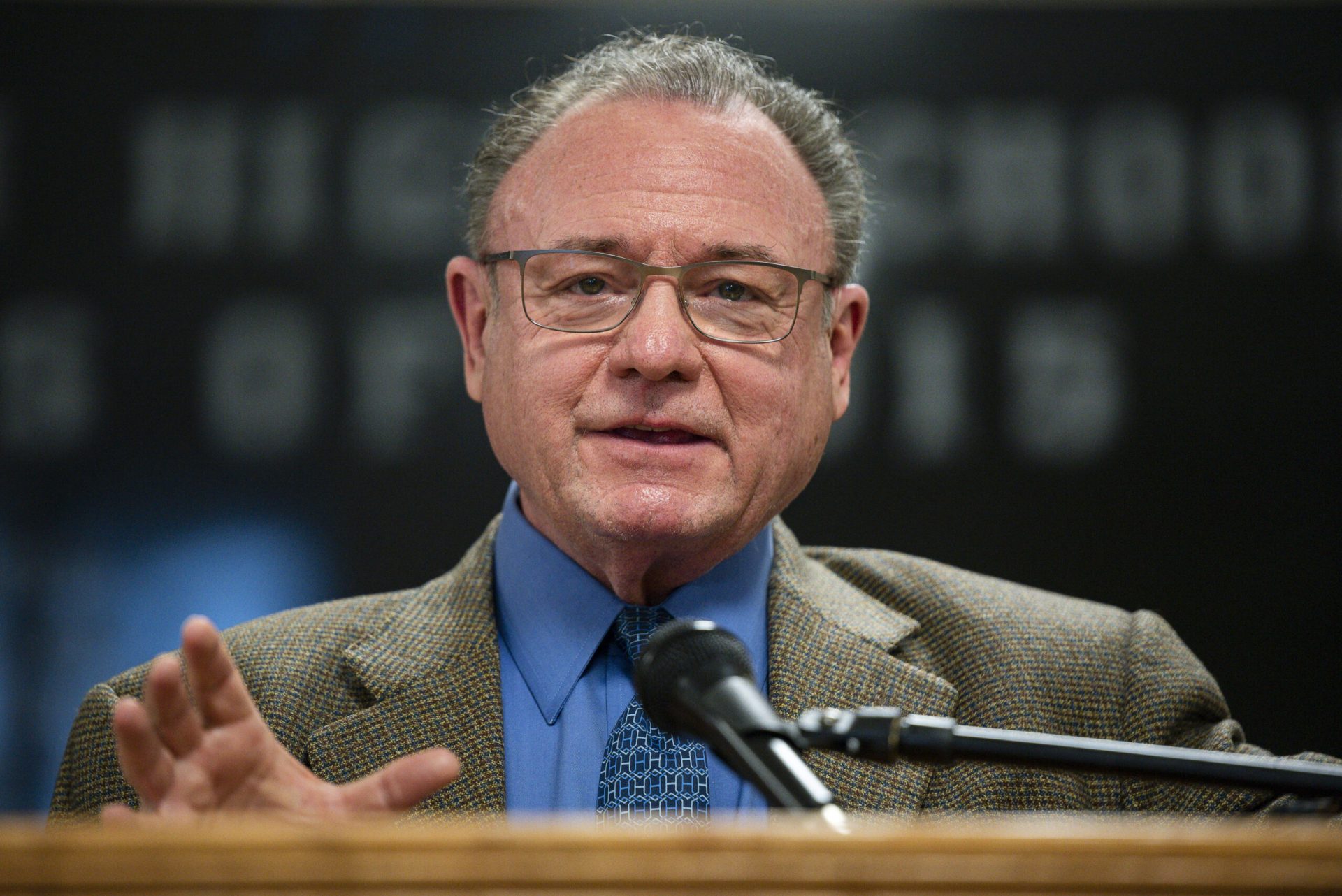With the prop of a very tall three-legged stool next to him, Ector County Independent School District Superintendent Scott Muri announced the pending receipt by the district of $55.9 million in federal stimulus funds Thursday in the foyer of Permian High School. The funds will be spent over a three-year period.
Noting that the ECISD Board of Trustees, members of the community, business leaders and others had pushed for it, Muri thanked Gov. Greg Abbott and members of the state House and Senate for letting the funds flow. Muri noted that the stool came courtesy of Raise Your Hand Texas and its Regional Advocacy Director Amy Dodson.
Muri has said the funds will be used to help students make up the unfinished learning they’ve experienced during the pandemic.
“The pandemic has created challenges for school districts all across the state of Texas, across this country and really around the world,” Muri said. “And we lift up the heroes that have made learning possible for our students, heroes that we call teachers that in this district, literally over a weekend transitioned from teachers that taught in a face-to-face environment to teachers that taught virtually. We lift up our cafeteria workers that went from serving food in a traditional cafeteria to actually delivering meals to people’s homes, to the homes of our students.”
“Today we lift up our custodians whose job has really changed because of the extra cleaning and opportunities that have arisen because of the pandemic. Our administrators have had to think differently about how we do school in this pandemic and our students and families, the pandemic has created a different type of learning environment for each of them. So today, we recognize and celebrate the good work of those individuals. At the same time as all of this was happening, we also recognize that the learning of our students has not been optimized over the last 14 months of this pandemic,” Muri added.

As the year draws to a close, Muri said student learning is not complete.
“Many of our students in Ector County and across the Permian Basin have unfinished learning; learning that needs to continue. We also, as we listen to our students, we hear them talk about their social and emotional needs; their own mental health; well being. Our kids are telling us that they need … their school district to welcome them with open arms,” Muri said.
He added that when school begins again in August, it has to be done thoughtfully as many of the students are dealing with anxiety and social and emotional issues that “none of us may be able to fathom,” because of the pandemic.
“And all of this requires a significant investment in the education of our children and their well being,” Muri said.
He said students are going to need additional tutoring.
“We’ve talked locally about providing a high dosage of tutoring over the next three years to help our students complete their unfinished learning. We’re going to add additional days to the school year,” Muri said. “In fact, we’ve added 30 more days to the school calendar for elementary students. Those days come at a cost and we appreciate, again, these federal stimulus dollars that will help us fund those opportunities, not only for elementary students but for middle school and high school students as well.”
“We need to invest … in the social emotional needs of our children. We’ll be purchasing a curriculum, pre-k through 12th grade that … will help our teachers, that will equip our teachers with the tools and skills they need to effectively meet the needs of our students,” Muri said. “Learning is different now because of the pandemic and the level of development of our teachers. … We will invest heavily in the professional development needs of teachers in ECISD. And so we have plans for these dollars. In fact, more plans than just that $55.9 million will include.”
Muri said there is still funding from a second installment of federal funds that ECISD does not know when it will get. He anticipates that will be an additional $25 million.
“We have plans for those dollars as well. Our students need that money locally, and so we would ask our governor or lieutenant governor and members of the House and the Senate that they consider the funds that are available — those federal funds” so they can be used to invest in the district’s 32,000 students.
He noted that the funds are needed by every single school district throughout the region.
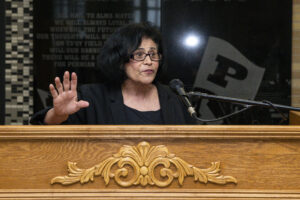
ECISD Board President Delma Abalos said teachers and staff have worked very hard during the pandemic to make sure the district’s students and families are taken care of.
“Whether everybody recognizes it or not, we are dealing with an education crisis because of COVID-19. … In March, our school board adopted a resolution asking the state government to pass on our money to us because we need it,” Abalos said. “It’s not just that we want more money, it’s that we need it to address the needs of our students, whether in prekindergarten or in high school, getting ready to graduate we needed to help them be better and more successful in life.”
“It’s nice to say that our school district was the first to pass a resolution,” Abalos said. She added that it was suggested by trustee Donna Smith.
Abalos stressed that education is such an important part of a person’s success and that it can’t be done without funding from the federal government during these trying times.
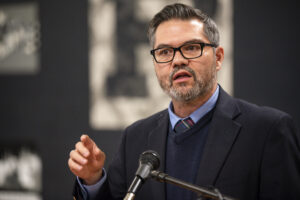
Education Partnership of the Permian Basin Executive Director Adrian Vega said there will be a superintendent leadership summit May 5 at the Bush Convention Center in Midland in conjunction with his organization and the Permian Strategic Partnership. Vega said this is under the guidance of Muri and TJ Parks, superintendent of Hobbs Municipal Schools.
Vega said it will include 50 or 60 school districts in the Permian Basin and Southeast New Mexico, “specifically to strategize and think through the most impactful ways that our school districts can use these dollars.”

Odessa Chamber of Commerce President/CEO Renee Earls said the chamber represents more than 27,000 employees from more than 700 businesses and organizations that are chamber members.
“… They know that any success in business, the key of that, the foundation, is success in education. Just last week, the Odessa Chamber was so proud to announce that Nacero, a company, has chosen Odessa from all over the country to come here and build a facility, a business that will equal almost $7 billion; billion with a B. As a note, that is about six different Tesla plants. All of our state is so excited to try to get a Tesla plant at a billion dollars. We’ll be getting a $7 billion business, but that business did much research across the country and they chose Odessa for many reasons, but they will rely on the students who are walking the halls of this school and every school in the district to be their future employees. It is paramount that we provide our students with a sound education, that they receive the skills and the knowledge that they need to move forward and have a successful career. Most of those students in our public schools today here in Odessa will stay here in Odessa and become employees and future leaders. It is important that we advocate, and we join the district and Raise Your Hand Texas in advocating for the funds that were intended for these districts. It’s important that these students have a firm foundation, just as this stool needs here to stand, and they can do that with that money that was meant to come to these districts from the federal government. I also want to just take a moment to remind us, because Raise Your Hand Texas and ECISD led off with their advocacy and their words of action, that is why yesterday the government said they would give the money. They heard the noise. That is the democratic process, so I certainly applaud those who made their voices heard that this money was intended for this the entire time. It just goes to show that this campaign and others do make a difference and your vote matters and your voice matters. And these students that we have in ECISD today will be our future voters,” Earls said.

Ray Perryman, president and CEO of The Perryman Group, offered some demographics.
Perryman said schools in Texas are 52.8 percent Hispanic. In Ector County, it’s over 75 percent.
He said that percentage, which will reach 60 percent in 20 years, control 5.7 percent of the household wealth in Texas. Basically, Perryman said that means you’ve got half the children and 5 percent of the money.
“That’s not a good situation. Black students constitute 12.6 percent of our student population and they have 2.2 percent of the wealth in Texas. So, you have two thirds of our student body dealing with around 8 percent or less of the total wealth in Texas,” Perryman said.
He added that this means those children don’t come to school as well prepared.
“They don’t have the resources to deal with something like a pandemic in the same way that other kids might. They don’t have the opportunities for summer enrichment programs, or professional tutors or anything else they might need to help them along the way. And so we have to recognize that demographics is a real issue in Texas public education and it’s evolving quickly. Twenty percent of the kids enrolled in Texas today, one of every five has an English deficiency — 20 percent. In 10 years, that number is going to be very close to 25 percent; one out of every four. That means they come to school, it brings a bigger challenge to the schools, also takes more resources to educate those folks. If you walk in any two classrooms in Texas, if you walk in random two classrooms and look at the students in those two classrooms, on average one kid out of the kids in those two classrooms is homeless. We have a very different demographic here in Texas and it varies around the state, but a very different demographic to work with; a lot of challenges with that. It takes more resources. We rank 41st or 43rd, depending on which indicator you use in the country, in funding for schools. It’s been flat for 10 years on a per student basis. It hasn’t grown in 10 years,” Perryman said.
He added that all the other demographic factors have intensified during those 10 years, which basically says we’re falling behind, and all that happened before COVID.
“And then along comes COVID. We really won’t know until the fall, the educators tell me, exactly what the impact of this has been on our student body. The best research available right now says, on average, students have lost five to nine months of education. So between a semester in school and education on average. One out of every 10 — more than one out of every 10 kids, about 11 or 12 percent of all the kids had no connection at all with the schools this year. So that’s what we’re facing right now. That’s the situation we’re facing. The federal government recognized that and they provided these funds and it’s a lot of money. It’s serious money for school districts all over the place,” Perryman said.
He added that ECISD needs the funds for all the reasons Muri mentioned.
“Different districts have different needs. Some districts need ventilation. Some districts need to repurpose spaces in a different way. They need to invest in kids. They need to invest in teacher training, materials; everything Scott mentioned. And one that is probably not covered by this plan, but it’s a very big one, over 60 percent of the kids in this state get subsidized food through the education system. We know hunger went up 50 percent during the pandemic. We don’t know what that percentage is today. We don’t have the numbers yet; it’s big. And a student can’t learn if the student’s hungry. My firm has done research on hunger for the last 15 years, and a student can’t learn if they’re hungry. … We have these incredible challenges, and the census just came out this week. It tells us the U.S. population is not growing very fast and we’re going to need a whole lot of workers in the future. Education is great for a lot of reasons that have nothing to do with work in terms of our enrichment, our community support, our quality of life; everything comes with it. But it’s critical to the future of our economy and the places that can provide a trained workforce in the future are going to have a huge advantage over anybody else when it comes to competing for anything in the economy, because we’re running out of people. And we need well trained people for the future. And that creates some real opportunities. This money can be and not only do the things we’ve talked about. It’s a game changer,” Perryman said.

